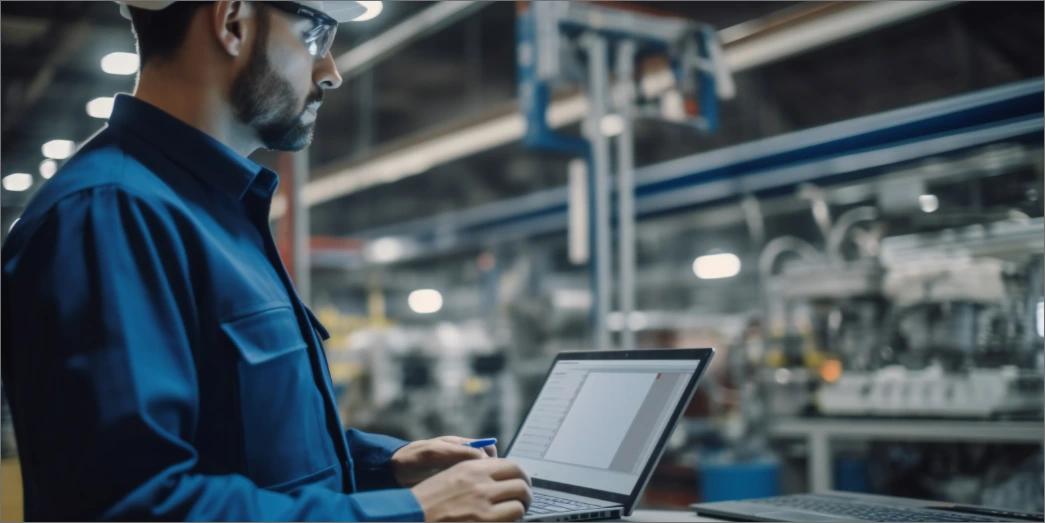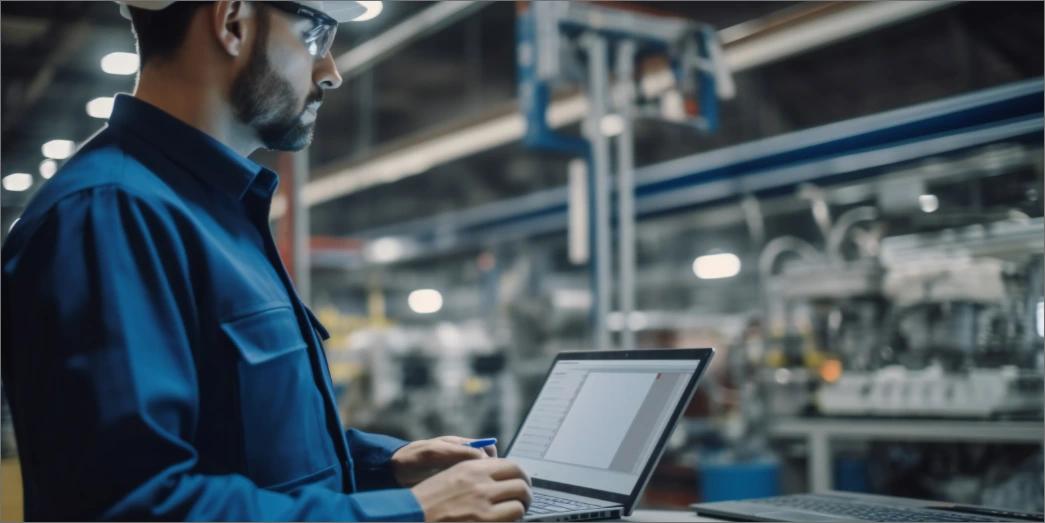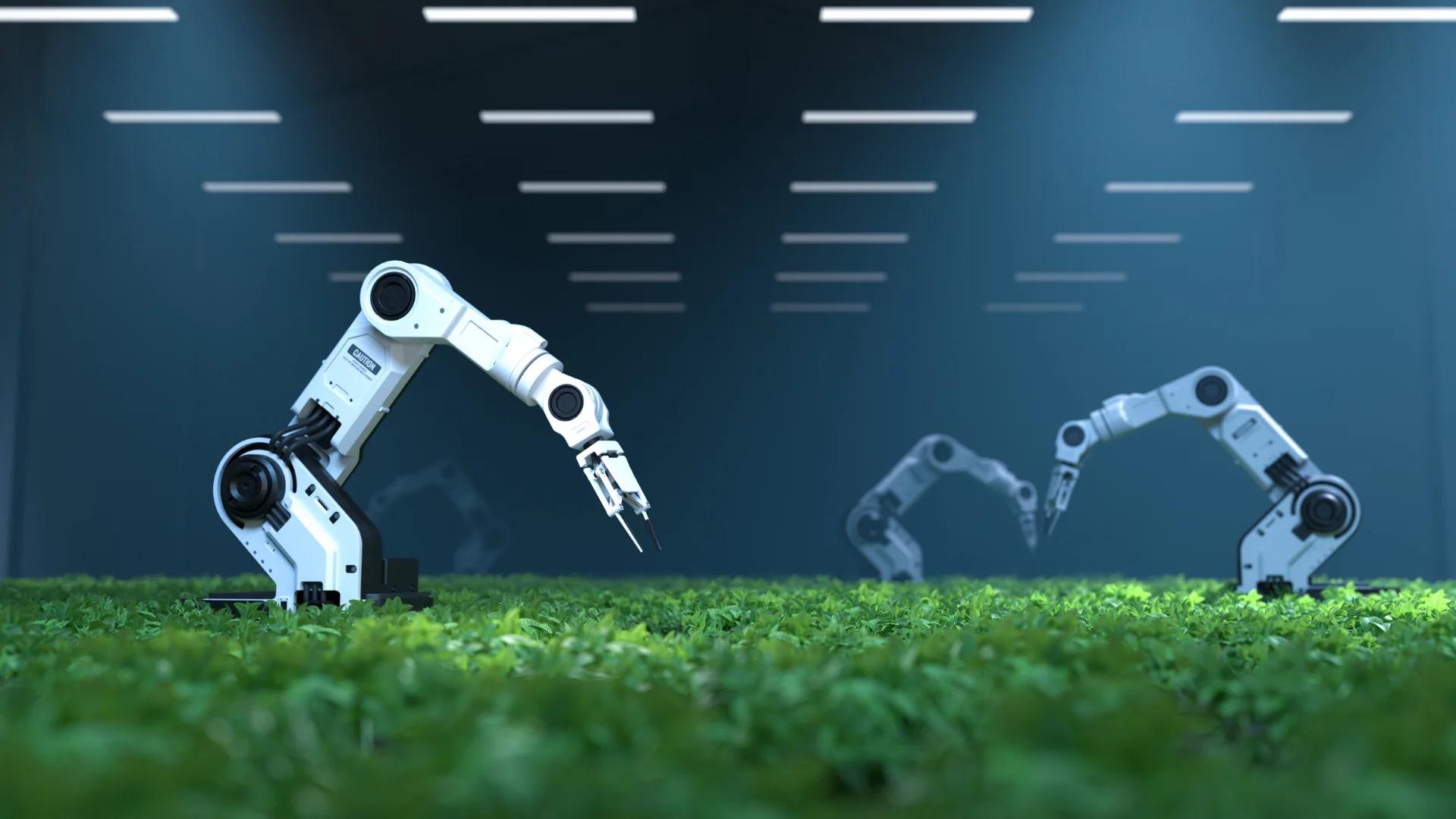
BLOG
03 mins read
Industrial IoT - How Car Manufacturers Use IoT In Their Assembly Lines?
Thiyagu Ganesan
Posted: Sep 26, 2023
Table of Contents
IIoT(Industrial Internet of Things) Revolution In The Automotive Sector
IIoT in the automotive world means connecting every component and device, turning them into data sources that communicate in real-time. Sensors embedded in machines monitor their health, while smart devices oversee quality control. The result is a seamless blend of human expertise and machine precision.
https://www.techtarget.com/iotagenda/definition/Industrial-Internet-of-Things-IIoTThis revolution enhances productivity, reduces downtime, and optimizes resource allocation. Car manufacturers no longer operate in the dark; they have access to a wealth of data for informed decision-making.

Smart Factory: A Connected Ecosystem
Smart Factory is a hub of interconnectedness - sensors, machines, and devices communicate effortlessly, sharing critical data in real-time. This constant flow of information empowers manufacturers to optimize operations, detect anomalies, and implement predictive maintenance strategies. With IIoT, the Smart Factory transforms into an intelligent entity capable of self-monitoring and adaptation. Production lines adjust in real-time to meet demand fluctuations, and quality control becomes more rigorous, reducing defects.
https://ticvic.com/internet-of-things/IIoT In Vehicle Component Manufacturing
IIoT seamlessly integrates into the production of car components, redefining precision and efficiency. Sensors and smart devices, embedded within machinery and workstations, serve as vigilant sentinels. They monitor the minutest details, from temperature and humidity to the performance of cutting-edge tools. This real-time data offers a panoramic view of the manufacturing process, enabling predictive maintenance. When a machine shows signs of wear or an impending issue, it’s identified and addressed before it can disrupt production.
Streamlining Assembly Line Operations
Streamlining assembly line operations is at the forefront of Industrial Internet of Things (IIoT) applications in the automotive industry. IIoT harnesses real-time data from sensors, machinery, and devices, enabling manufacturers to monitor production processes closely. This data-driven approach allows for predictive maintenance, where potential issues are detected and addressed before they cause downtime, ensuring a continuous workflow.
https://www.linkedin.com/pulse/exploring-impact-internet-things-automotive-industryQuality control receives a significant boost with IIoT, as it provides a constant stream of information for assessing product quality. Any deviations or defects can be identified and corrected promptly, minimizing waste and improving the overall output’s consistency. By making assembly lines adaptable and responsive, IIoT ensures manufacturers can meet changing demands and product configurations more effectively. This level of optimization results in increased efficiency and reduced costs, making IIoT a pivotal technology in reshaping automotive manufacturing.

Supply Chain Visibility And Management
Real-time monitoring through IIoT enables manufacturers to track the movement of raw materials, components, and finished products at every stage of the supply chain. This enhances inventory management and allows for rapid response to disruptions, minimizing delays and ensuring just-in-time deliveries. Furthermore, blockchain technology ensures the integrity and security of supply chain data, reducing the risk of fraud and errors. By providing stakeholders with access to immutable, tamper-proof records, it fosters trust and traceability.
Future Trends In IIoT For Car Manufacturers
5G Integration
The integration of 5G technology into IIoT for car manufacturers is set to revolutionize connectivity. With its lightning-fast data transmission and low latency, 5G enables real-time communication among devices, paving the way for ultra-responsive autonomous vehicles, efficient factory operations, and advanced remote monitoring. This high-speed, low-latency network will also enhance over-the-air (OTA) updates, enabling car manufacturers to remotely improve vehicle software, safety, and performance.
Edge Computing
Edge computing involves processing data closer to its source, reducing latency and the need for continuous cloud connectivity. In automotive manufacturing, this means quicker decision-making on the factory floor, allowing for faster response to anomalies and predictive maintenance. Edge computing will become pivotal for mission-critical applications like autonomous vehicle control and advanced driver assistance systems (ADAS).
AI and Machine Learning
AI and machine learning will continue to play a significant role in IIoT for car manufacturers. These technologies enable predictive analytics, quality control improvements, and anomaly detection, enhancing production efficiency and product quality. Furthermore, AI-driven autonomous robots can streamline material handling and assembly tasks, further optimizing the manufacturing process.
Sustainability
As sustainability becomes a central focus, IIoT will assist car manufacturers in reducing energy consumption, waste, and emissions. IoT sensors and data analytics can monitor energy usage, optimize manufacturing processes for minimal environmental impact, and help recycle and reuse materials.
Digital Twins
Digital twins, virtual replicas of physical assets or processes, will become more prevalent in automotive manufacturing. They allow for detailed simulations and analysis, enabling car manufacturers to fine-tune production processes, predict equipment failures, and optimize product design before physical implementation, ultimately saving time and resources.
Supply Chain Resilience
The COVID-19 pandemic highlighted the importance of supply chain resilience. Car manufacturers will leverage IIoT to create more robust and flexible supply chains. Real-time tracking, demand forecasting, and supplier collaboration tools will be essential for mitigating disruptions and ensuring a steady flow of components.
Human-Machine Collaboration
IIoT will continue to foster human-machine collaboration in automotive manufacturing. Augmented reality (AR) and wearable devices will assist workers in tasks such as maintenance and quality control. Collaborative robots, or cobots, will become more prevalent, working alongside humans to improve productivity and safety.
Related Blogs
How AI & ML Is Transforming The Farming Industry?
The farming industry is poised for a remarkable transformation as it embraces the best technologies available. From precision agriculture and resource optimization to sustainable practices and data-driven decision-making, these technologies have the potential to revolutionize traditional farming methods. By leveraging innovation, farmers can unlock a multitude of benefits, including increased productivity, optimized resource management, enhanced sustainability, and data-driven insights.
Evolution Of Testing From Manual To Automation
Testing is a crucial process in software development that involves evaluating the quality, functionality, and performance of a software system. It is performed to identify defects, errors, or issues and ensure that the software meets the desired requirements and performs as expected.
Cybersecurity - How To Manage Your Digital Identity?
In the wild, wild west of the digital frontier, wrangling your business’s digital identity is like taming a band of unpredictable cyber outlaws. Picture yourself as the digital sheriff; your mission is to maintain law and order in this vast online town.
Create Virtual Machines Using Microsoft Azure, Google Cloud, Oracle Cloud And AWS
In today’s cloud computing, virtual machines are gaining importance since they provide enterprises of all sizes with flexibility, scalability, and affordability. Several well-known cloud service providers stand out for their robust architecture and extensive selection of choices for creating virtual machines.
Industrial IoT - How Car Manufacturers Use IoT In Their Assembly Lines?
IIoT in the automotive world means connecting every component and device, turning them into data sources that communicate in real-time. Sensors embedded in machines monitor their health, while smart devices oversee quality control. The result is a seamless blend of human expertise and machine precision.
Is Outsourcing A Viable Option In 2023?
Outsourcing is a strategic business practice in which organizations delegate specific tasks, functions, or processes to external third-party service providers rather than handling them in-house. This approach offers numerous advantages, including cost savings, access to specialized skills, and increased operational efficiency.
Agile IT Product Development
Agile IT Product Development has become a buzzword in the software development industry in recent years, as businesses strive to keep up with the fast pace of technological advancements and changing market demands. In essence, Agile is a methodology that emphasizes iterative and collaborative development, continuous improvement, and customer feedback.
Flutter 2023 And Beyond
In 2023, Flutter stands at the forefront of the mobile app development landscape, continuing its remarkable journey of growth and innovation. This open-source framework, developed by Google, has evolved from its initial release into a versatile powerhouse, offering an extensive set of tools and capabilities.
MongoDB Lets Developers Say No To Structural Databases.
When it comes to database systems, developers have a lot of options to choose from. There are traditional relational database systems, such as MySQL and Microsoft SQL Server, as well as newer NoSQL database systems, such as MongoDB and Cassandra.
Advantages Of Using SDN & SDWAN
The network is the backbone of any business. It is responsible for connecting people and devices, and it enables the flow of information and resources. A well-designed network can be a powerful tool that helps businesses run more efficiently and effectively.
The Future of Networking Is Autonomous — Not Automated
Cloud networking has quietly crossed an invisible threshold.More clouds. More edges. More tunnels. More devices. More telemetry. More failure modes no human can track in real time.
Beyond Hop-by-Hop Path Analysis: The Missing Layer in Modern Network Observability
Hop-by-Hop (HBH) Path Analysis is the missing layer because it reveals the truth about the path, not just the endpoints.
Beyond Hop-by-Hop Path Analysis: The Missing Layer in Modern Network Observability
Hop-by-Hop (HBH) Path Analysis is the missing layer because it reveals the truth about the path, not just the endpoints.
The Future of Networking Is Autonomous — Not Automated
Cloud networking has quietly crossed an invisible threshold.More clouds. More edges. More tunnels. More devices. More telemetry. More failure modes no human can track in real time.
AI in SD-WAN: Beyond Performance Scores and Pretty Dashboards
The Truth about “AI-Powered SD-WAN” — Most of it isn’t AI at all .The Lie: When intelligence becomes decoration
Network Failures Are Not Random: Unmasking the Deterministic Patterns of the “Dark Space” — Part I
If you’ve worked in networking long enough, you’ve heard this sentence hundreds of times. A user complains, a service slows down, or a region disconnects
From Monitoring to Autonomy: Building the Predictive Network — Part II
In Part 1, we debunked the myth that network failures are random. We explored how traditional tools miss the “Invisible Middle Mile” and why Hop-by-Hop (HBH) analysis is the required telemetry layer to see the deterministic patterns behind every outage

Let's talk.
Need a Consultation!
Need help in turning your idea into a successful product? Talk to us. We can help you build your product quickly and ensure it can scale infinitely.
Let's talk.















